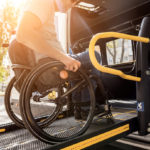Do You Advocate For Your Accessibility?: Tips On How To Be Effective

When something as life-changing as a spinal cord injury (SCI) occurs, it often opens our eyes to things we didn’t see before.
These realizations may move you to speak out about or act on information you now have. It may make you want to stand up for something you now passionately believe in or fight against something you recently realized was a problem.
Often, people who have disabilities become advocates for all individuals with disabilities. They may address issues of public accessibility, discrimination, or even respectful language. Sometimes they become involved in new healthcare trials and experiments. If you have recently become passionate about an issue like this, what can you do?
Do Your Research
First, educate yourself on your topic. You need to become an expert on the issue. If you want to advocate for or against something, you have to have all of your facts straight. The internet can be a wealth of information, but it’s important to make sure the sites you are getting your information from are reliable. Government sites, universities, and hospitals often post good information.
As a wheelchair user, you can also do your own first-hand research. You have personal knowledge about the difficulties and barriers someone with a disability might face. You will also have ideas as to how these situations can be changed and improved.
Be Social
Social media is a terrific platform for networking with and advocating to a worldwide audience. Messages spread quickly on social media, which you can use to your advantage. On Facebook you can find or create your own groups. And on many platforms you can use hashtags to make your topic easily searchable or to highlight it and attract the people you are targeting.
You can also find other people who have similar goals and passions. You may wish to support each other or work together to create a stronger social media presence. If you are fundraising, social media is also a great platform for telling your story and collecting donations.
Use Your Position To Your Advantage
You are a wheelchair user. This places you as the best person to advocate for accessibility. You aren’t just advocating from someone else’s point of view; you have personal knowledge, experiences, and feelings that come into play. Anyone is able to see and point out an issue. However, when you have firsthand experience with the existing problem, and you have practical suggestions for creating successful alternatives, people are more likely to listen to you.
Your day-to-day experience really does position you as an “expert” in your field of knowledge. And the opinion of an expert is much more likely to be trusted than that of someone who has less investment in the topic at hand.
Start Locally
Before deciding to save the world, you may want to start locally. National or international changes could be a long term goal, but the best place to start practicing advocacy is right in your own neighborhood. Do you have a favorite restaurant that is difficult to navigate? Do you have an idea that would make your local market easier to visit?
Starting local gives you the chance to solve problems on a smaller scale. You may also have more success talking with, and organizing change among people that know you are familiar with you as a community member or patron.
Have Fun
Finally, remember that while advocacy can be hard work, it shouldn’t make you miserable. You should enjoy the process of making change for the good of yourself and others. If it is too stressful or frustrating, you should re-evaluate what you are doing and see if you need to take a step back. As long as you maintain good boundaries and don’t let it start dictating your emotional health, advocacy should become an exciting and fulfilling part of your life.
Author: Annie Beth Donahue is a professional writer with a health and disability focus.








